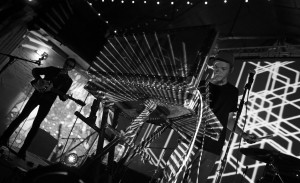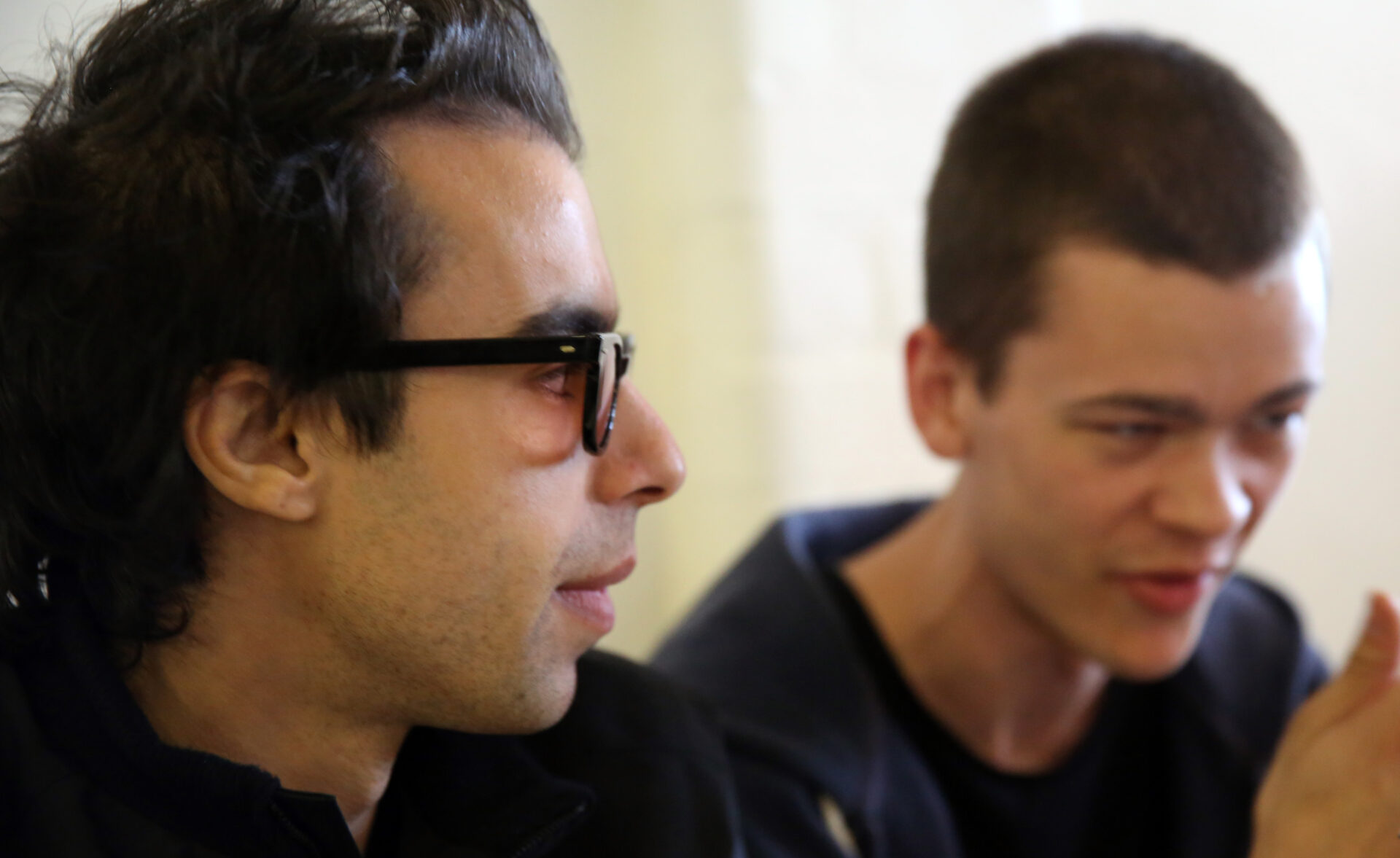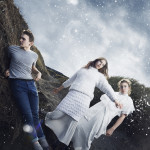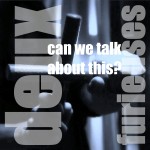Given their relatively short history The Vacant Lots have a lot to be excited about. Having recently joined the congregation of Sonic Cathedral, this US psych punks’ debut album was brought into being with the help of Spaceman 3‘s adventurer Sonic Boom. This summer they toured with The Brian Jonestown Massacre and are now working with Suicide’s Alan Vega. Not content with these (super)sonic achievements, earlier in the year the band’s guitarist, Jared Arnaud, published a book of poetry. And when it comes to visual aesthetics, the bands’ striking, hypnotic monochrome projections and album artwork goes beyond the norm of established psychedelic forms and motifs. So impressed were we with their Liverpool Psych Fest performance, we couldn’t pass on a chance to meet Jared Artaud (vocals/guitar/drone) and Brian MacFadyen (percussion/vocals/electronics) and ask them about their understanding of psych, future plans, musicals tips and dislikes.
GIITV: Is this your first time in Liverpool?
JA: It’s our first time in Liverpool. The last time we were in England was with The Brian Johnstown Massacre over the summer. This second time around has been really good to us. One day in Liverpool so far – really exciting shows!
And how are you finding the festival itself?
JA: I don’t know.. .from different perspectives… In just a short time it’s been going – only its second or third year – it’s impressive: the number of installations and things they have for the concert goers. From the artists’ perspective …I don’t know…It’s lacklustre to say the least but I think it’s a kind of a process.
In what sense is it lacklustre?
BM: Hospitality. From the food to the drinks to the places you stay…
JA: …or just passes every day. I heard from bands they didn’t give them band passes the second day so they couldn’t get food, drinks and stuff.
I guess there’s a kind of charming DIY element to it. It’s an alternative festival.
JA: To an extent. For example, our show was completely packed, the festival is completely sold out and you would expect the same treatment for the artists as you would for the concert goers. On the other hand, the festival itself is amazing! For example, Heretic and Psych For Sore Eyes – beautiful artwork and installations. Piccadilly Records are here – it’s incredible! The level of enthusiasm from the crowd and the reaction! People seem to be here for the music because they genuinely enjoy it as opposed to, you know, playing a club or a rock show, where it’s just a thing to do, or ‘hey, we just gonna check this out’ attitude. We played to a packed room, so we couldn’t be happier and we were happy with that performance as well.

Are festivals in America different? Are there any similar kind of festivals?
JA: It varies. As far as similar festivals go, Austin Psych Fest has really made a lot of waves, and you can see a lot of similarities between Liverpool Psych Fest and Austin Psych Fest. And now Austin Psych Fest is branching out to Levitation over in France. We haven’t been yet but we hear similar names in terms of aesthetics, bands playing… Denver Psych Fest, which is an up-and-coming music festival in Denver, Colorado. On this tour we did Psych Out Fest in Madrid, and you can see more and more cities embracing psych music, whatever that means. It’s been really good…
Like you say, ‘whatever that means’. Psych has become a very broad church. What does it mean to you?
BM: I don’t know. Certain elements people relate the term to is things like shitload of reverb, or kind of repetition, or a lot of integration with video projections and stuff like that…but it’s obviously too massive, too vague a term… It fragments down. It’s one of those things where it’s easier when you just try and put a label on it but it’s kind of lost in translation most of the time. It doesn’t really describe anything. It just kind of gives you the first impression, and from there you have to actually figure out what it is.
JA: Fundamentally, psych is about mind expansion, whether that’s music or art, so in that sense it seems like you can see many different perspectives. It’s not so narrow minded and limited as to say it’s ‘just guitar and drums’ or ‘a type of guitar solo’. Psych is very expansive. Mind-expanding themes and ideas. You can trace that back to people like Arthur Rimbaud or Jean Luc Godard. So it’s in art and in film as well.
There’s definitely a strong 60s flavour to what we understand by psych. And it’s very visible and audible here.
JA: Psych formed way before the 60s. Even something like Robert Johnson could be psych. There’s a vast scope of what you can do within that genre.
BM: I think there is this public perception…The easiest or simplest description of psych are those bands that played in the 60s, like Elevators (13th Floor Elevators) or Red Krayola. It’s easiest so you don’t have to do all those subdivision. It’s been around a lot longer than that though, I think.
I guess, in the modern sense of psych, there is also a very distinct 70s element to it. For example, you mentioned krautrock before. So where do you feel you fit into this artistic horizon?
BM: I don’t think so much as fitting in as doing something different within a context. We don’t see what we do as psych, but we’ve been described as such. For us it’s about creating a new and modern type of music. Perhaps using some elements that are also shared with other preceding psych group. For us, more importantly, it’s about playing what we like and creating our own style. We can express ourselves through different media – whether it’s cinema, using visuals behind us, or poetry – as we strive to write in a way that really pushes ourselves as much as the music. In that sense it’s really hard to define what we do other than ‘we know what we like and what we don’t like, and how much you can produce and achieve within the limitations of working with two people.’ That’s really been our essential aesthetic.
You’re now signed to Sonic Cathedral, which is a very distinct small label here in the UK. How did this collaboration come about?
JA: We were invited to do a compilation album, the first Psych for sore eyes and through that we built a relationship with the label. And when it came time to shop around our record they were very interested. It seemed like a perfect fit to work with the label that was not only interested in the music but genuinely supportive of the artistic, the graphic design work that we do. You know, the visual aesthetic aspect. We couldn’t have found a better label.
Earlier this year you released your debut album Departure, how have you found touring the album so far?
BM: It’s been kind of an interesting process because there’s obviously a lot more limitations doing things live. In the studio you can multitrack 20-30 instruments with just one person. Or two in our case. But live you’ve only got so many hands so it’s been kind of a process of re-interpreting a lot of material to make it work in a live aspect adding electronics and things. It’s interesting…A lot of the tunes maybe the same lyrics and the same progressions but are completely different when they sound next to each other, the live and the recorded. It’s virtually completely different songs. It’s kind of a cool way to add extra bits to the catalogue.
And, of course, the reason many fans go and see live shows is because familiar material sounds different.
BM: You hear something on the record, then you go and see the band live and it’s a completely different track. Then you’re halfway through it gets familiar and go, ‘Oh shit! THAT’S what it is!’ That moment, I think, is really cool.
JA: We also very much enjoyed going to places we’d never been before. For example, we’d received offers to go to South Africa and Greece and Scandinavia, so at this point we’re just really going where people are inviting us to play. It doesn’t really matter whether it’s Asia, or Russia, or Norway – we embrace it internationally!
Amazing! So where are you going next?
JA: We’re starting to plan a tour in March around England again. We couldn’t do Manchester this time, so hopefully we’ll play Manchester and London again. And we’re looking into Germany, Scandinavia, hopefully coming back through to France, Italy, Spain and everywhere in-between. We’ll just keep touring. We enjoyed it. With just the two of us we’ve kept things really stripped down and minimal, so it makes things easier on the road. With 4 or 5 egos in a car who haven’t slept very well or eaten very well – what can possibly go wrong?!
Do you have a favourite place you’ve played?
JA: I think for me it’s London. There is a certain energy and connection. It seems the shows we’ve done there…well…they really embrace us. We played the Roundhouse with the Brian Johnstown Massacre, which was by far the most magnetic and magnificent place we’ve ever played. Just an honour to be tied into something that’s so culturally and historically important.
BM: I think The Social was cool. We did an album release show there. It’s a small place but it sounded really good in there.
You’ve now worked and toured with very big names like Sonic Boom or Alan Vega. How did you feel working with these musical titans?
JA: We’ve made it important for us to work with people that we admire and truly respect and have an immensity of reverence for. People like Alan Vega, Sonic Boom and Anton Newcombe. Without these artists who’ve inspired us we wouldn’t be doing what we’re doing. Hopefully some day we can inspire younger artists to make music and make art in the same way that these artists inspired us. It’s like a lineage, or cycle of influence and inspiration. And it’s still very surreal to just think about people who we’ve worked with: it’s incredible to be able to confide in and converse with people you respect so much.
Are there any bands that you would recommend?
JA: I really like Cheval Sombre, who are playing here at the festival with Sonic Boom. I really love The Black Ryder, they are a band originally from Australia but are now in LA. The Black Angels have been a true inspiration for us.
BM: It’s this band Cave. I’d never really heard of them before, and a friend of mine had a cassette of their new record that was really fucking good…Kind of krautrocky, long instrumental grooves. I don’t know too much about them but I’ve been really into that recently.
JA: We just did an interview with Simone Marie on Soho Radio in London. It’s called Naked Lunch. You can search for it. We played the music that was essentially our tour mixtape. Songs we’ve listened to hundreds of times on the road this tour. So for things we’re listening to at the moment and really like – it’s archived now on Mixcloud.
http://www.mixcloud.com/sohoradio/simone-maries-naked-lunch-24092014/
It’s always good to hear new stuff, to hear recommendations from people. And do you have any dislikes?
JA: Well, when you start thinking negatively it can get very dark…
BM: Just from playing shows you realise how easy it is to play an awful fucking show, even if it’s not your fault. And if you haven’t heard someone’s record…There are plenty of bands I’ve seen I know their records are great, but they sound terrible live. It’s really hard with that first impression when you know it can go one way or the other.
Some of the best bands I’ve seen can do amazing live sets and then awful live sets. You can’t judge a band on just one show.
JA: You never know. Here’s another dislike: don’t judge a band by the way they sound on YouTube. YouTube is the furthest thing from the truth of what a band sounds like live. In order to know you need to go there and experience it, see it and feel it through all your senses. You can’t determine the quality of a band through something like YouTube.
Do you get pissed off when people film and watch the entire gig through their phone?
JA: No, because I think documenting is very important. I think it also creates an outlet for people to join in, to be part of the experience. I have no problem with people doing whatever they like to do.
Do you think it might distract people from actually enjoying the immediacy of that experience, from being ‘in the moment’?
JA: It’s the 21st century! People’s attention spans are so fleeting and quick. One minute you go on Twitter, then you’re on Facebook, then you’re talking to someone on the phone. It’s one of those things…People are always on their phones anyways so it’s better than just texting or Facebooking, at least it’s they’re documenting something. You’re always gonna have screens in the audience. As long as they’re not flashing someone’s actually getting something, and it’s reviewed and archived. It’s some benefit at least. There’s no point in trying to control people. Let people do exactly what they want. However, if you gonna rip the album and download shit on the computer, do as you will. But if you want to support a band and you want them to keep making records, buy their fucking album, come to their show! Supporting the arts is really important, especially in the day and age when digital world has made it so accessible to take whatever you want. Stream shit on Spotify that doesn’t pay bands. I’m not hating the digital world but I’m just saying if you really want to make an impact and make a change – support the bands you like, come to the show, buy their records! Share the music with your friends by all means but there needs to be some common ground. It’s a two-way street and people shouldn’t forget that.
Indeed. And as Jared was being so nice about it, why not start today and get yourself a copy of The Vacant Lots terrifyingly awesome debut Departure here. Sadly, their European sonic adventures are over for this year but stay tuned for more transatlantic psych goodness in 2015.
Read our review of Liverpool Psych Fest here.
Photo credit: Simon Godley




